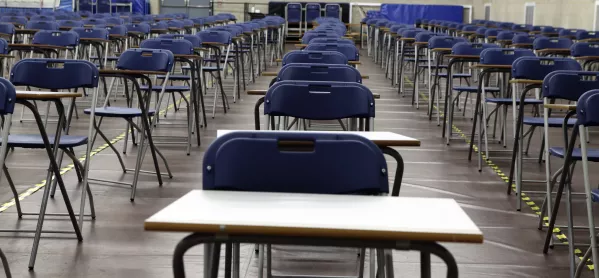- Home
- Exclusive: Investigation into ‘double entry’ of maths GCSE candidates
Exclusive: Investigation into ‘double entry’ of maths GCSE candidates

Schools that appear to have entered pupils for GCSE maths with more than one board are to be investigated by the Joint Council for Qualifications and exam boards.
Freedom of information requests made to Ofqual and the Department for Education have revealed that dozens of schools “double-entered” their pupils for maths GCSE in England last year.
The practice is banned, but there is concern that schools are giving pupils two attempts at the maths GCSE due to pressure to perform well in league tables.
A freedom of information request by Tes to the DfE has revealed that 54 schools “double-entered” pupils of any age group for maths GCSE in summer 2016, and 43 schools double-entered pupils at the end of key stage 4, including one school that entered 69 pupils.
The exams watchdog, Ofqual, in response to a separate freedom of information request from maths teacher Mel Muldowney, revealed that 172 centres - including settings other than schools - entered students twice for maths GCSE, sometimes in different tiers.
Of these, 20 double-entered more than one candidate and nine entered 10 candidates or more. The analysis covered AQA, OCR and Pearson maths GCSEs.
A spokesman for JCQ, which is responsible for monitoring the exams, said it believes that 15 schools - entering around 400 candidates between them - merit further investigation.
The remaining schools had just one candidate in each school who appeared to have been entered for maths GCSE with more than one exam board. In these cases, the data will be re-examined.
‘Education is not a game’
Ms Muldowney, a maths teacher at Alcester Academy in Warwickshire, told Tes: “Double entry is going on. I can understand why - the pressure of accountability and desire to want to get the best result for students.
“But it is not fair and not right for the rest of us who are playing the game according to the rules. And what experience are those children getting of maths, having to sit nine hours of maths exams? That bothers me, it is turning kids off maths.
“It may be a small minority of schools but it is a moral issue - education is not a game.”
JCQ rules ban schools from varying the exam timetable to allow candidates to take exams in the same subject with different boards. Because the different boards’ maths GCSEs are timetabled to take place at the same time, this, in effect, makes it malpractice to double-enter pupils.
The JCQ policies and procedures document on suspected malpractice says that centre malpractice is: “Any act which breaks the confidentiality of question papers or materials, and their electronic equivalents, or the confidentiality of candidates’ scripts or their electronic equivalents.”
This could involve “moving the time or date of a fixed examination beyond the arrangements permitted within the JCQ publication Instructions for Conducting Examinations”.
The DfE uses a system of discounting to ensure that where a pupil has taken two subjects that have an overlap in curriculum, the performance tables only give credit for one.
The performance table rules were changed in 2013, so that only the first qualification taken in any subject was counted in the tables, but if qualifications are taken on the same day, then the best result is used.
The discounting guidance states: “However, schools should not vary the published starting time for an examination if there is a clash between papers of different awarding bodies or specifications in the same subject.”
The exam bodies are responsible for sanctioning centres that are guilty of malpractice. Sanctions can range from a written warning to withdrawing recognition - meaning the centre can no longer offer that exam body’s qualifications.
A JCQ spokesman confirmed that in such cases the sanction is against the centre, and a candidate’s result would still stand.
A secondary headteacher in the north of England, who wished to remain anonymous, said that he was concerned that schools had been double-entering candidates this year as well.
He said: “I think it is more of an issue this year than in 2016, with the change to numbered grades and uncertainty around boundaries and the new tiering.
“It is just about wanting it to be a level playing field for all of us. In the old days, with five A*-C including English and maths, it wouldn’t make a difference to a school whether a candidate got a C or a B - now, with Progress 8, it does.”
However, the JCQ said its inspection service had found no incidents to date this year.
A spokesman said: “The awarding organisations will carry out an investigation into any possible GCSE double entry by centres in the summer season 2016.
“The professionalism of schools and colleges in observing the JCQ regulations and informing when they are aware of malpractice, is valued by exam boards. Malpractice remains rare and cases are usually identified through the rigorous JCQ Inspection Service visits, whistleblowers and data analysis.
“Exam boards take malpractice seriously, and thoroughly investigate allegations. The small number of potential GCSE double entries that have come to light are being reviewed carefully and JCQ will continue to monitor this in the future.”
The DfE said that it was not possible to conclude from the data that malpractice had been committed, and that malpractice was investigated by the exam boards.
Want to keep up with the latest education news and opinion? Follow Tes on Twitter and like Tes on Facebook
Keep reading for just £1 per month
You've reached your limit of free articles this month. Subscribe for £1 per month for three months and get:
- Unlimited access to all Tes magazine content
- Exclusive subscriber-only stories
- Award-winning email newsletters



